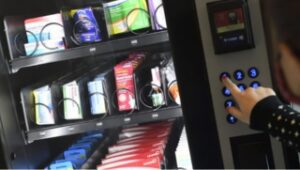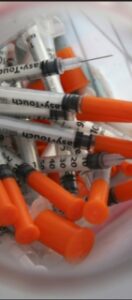Welcome to our wonderful world, where convenience and accessibility play a vital role in almost every aspect of our lives! And you know what? The healthcare industry is no exception.
Quick access to medical supplies and medications is crucial, especially in our fast-paced world. Luckily, with the continuous advancements in technology, we now have some amazing solutions at our fingertips, like medical vending machines.
But, we may don’t know what is a medical vending machine.
In this article, we’ll dive deeply into medical vending machines and what is medical vending machines used for.
We’ll explore all their fantastic benefits and the countless ways they can be used.
So, let’s embark on this exciting journey together and discover how these innovative machines positively impact the healthcare field.
What is Medical Vending Machine
Medical vending machines, also known as medicine vending machines or machines for medical supplies, are automated dispensing units designed to provide convenient access to a wide range of healthcare products.
These machines are typically found in hospitals, clinics, pharmacies, and other medical facilities, offering a self-service approach to acquiring essential medical items.
It is an automated machine that dispenses prescription drugs, medical devices, and other medical products when payment is made through an interface.
These machines can be conveniently installed at appropriate locations based on their intended purpose.
How do Medical Vending Machines Work
 Vending machine for medical supplies operate similarly to traditional ones but specifically focus on medical supplies.
Vending machine for medical supplies operate similarly to traditional ones but specifically focus on medical supplies.
They have a user-friendly interface that allows healthcare professionals, patients, and visitors to easily select the desired items.
The machines have various medical supplies such as bandages, first aid kits, over-the-counter medications, personal protective equipment (PPE), and more.
Users can interact with the machine by following simple instructions on the screen. Once the desired product is selected, the machine verifies the user’s eligibility, typically through identification cards or inputting necessary credentials.
After verification, the machine dispenses the requested item, ensuring a seamless and efficient experience.
What Are The Advantages Of Medicine Vending Machine

Medical vending machines offer numerous advantages that contribute to the enhancement of healthcare services.
Let’s explore some of the key benefits:
Accessibility and Convenience
One of the primary advantages of dispensing vending machines is their convenience.
By placing these machines in strategic locations within medical facilities, healthcare professionals, patients, and visitors can quickly access necessary medication dispensing without relying on staff availability or lengthy waiting times.
This accessibility helps save valuable time, especially in critical situations where immediate access to specific items can significantly affect patient care.
Dynamic Data and Inventory Control
Like other tightly regulated industries, the pharmaceutical retail market must adhere to various levels of compliance.
The availability of inventory data plays a crucial role for regulatory authorities such as the FDA and DEA.
However, the traditional method of manually recording extensive records poses significant challenges.
Integrating inventory management solutions into pharmaceutical vending machines proves to be an optimal solution to address this issue.
This innovative combination automates data entry at the moment of transaction, ensuring the immediate availability of real-time information to authorized personnel.
Round-the-Clock Assistance
Advanced pharmaceutical systems for dispensing medical supplies will significantly reduce wastage and minimize human error while providing enhanced tracking capabilities for the life-saving medications fire paramedics utilize daily.
In bustling areas such as airports, where foot traffic remains high at all hours, it is imperative to guarantee adequate daily staffing.
In such locations, medicine vending machine projects are an ideal solution as they operate tirelessly, unaffected by fatigue caused by time-related constraints.
Reduced Human Involvement
In the wake of the global COVID-19 pandemic, customers’ preference for decreased human involvement has grown.
While we may have surpassed the peak of this worldwide catastrophe, the valuable lessons of social distancing and personal hygiene will continue to resonate with us.
As a result, there is an increasing emphasis on minimizing human touchpoints in various processes, including pharmaceutical dispensing and vending machines.
Certain products, such as contraceptives and drug administration items, carry a societal stigma, where customers feel more comfortable interacting with a machine.
Recognizing this, the availability of vending machines and automated systems provides customers with a sense of security and privacy.
By reducing the need for face-to-face transactions, these technologies help prevent potential unsafe practices that might arise from a lack of means for private transactions.
Cost Efficiency
Medical vending machines help streamline the inventory management process for medical facilities. By automating the dispensing of medical supplies, these machines reduce the need for manual stock-taking and restocking efforts.
This automation minimizes the chances of errors and ensures accurate tracking of inventory levels, ultimately resulting in cost savings for healthcare providers.
Improved Patient Satisfaction
Medical vending machines improve patient satisfaction by eliminating the frustration associated with long waits for medical supplies.
Patients can quickly obtain necessary items, such as medications or wound care products, enabling them to actively participate in their healthcare.
The convenience of these machines enhances the overall patient experience, leading to higher levels of satisfaction and trust in the medical facility.
Extended Access to Healthcare
Medical vending machines are vital in extending access to healthcare, especially in remote or underserved areas.
By placing these machines in locations with limited access to medical facilities, individuals can obtain basic medical supplies and medications without the need to travel long distances.
This accessibility helps bridge the gap between healthcare providers and patients, ensuring that essential medical resources are readily available to those in need.
Applications of Medical Vending Machines
Medical vending machines have a wide range of applications across various healthcare settings. Let’s explore some of the key areas where these machines are utilized:
Hospitals and Clinics
Medical vending machines have extensive use in hospitals and clinics, providing immediate access to emergency medical supplies, medications, and other essential items.
These machines are strategically placed in critical care units, emergency departments, and other high-traffic areas to ensure the rapid availability of medical resources.
Pharmacies
Pharmacies can integrate medical vending machines as an extension of their services.
These machines can be placed in easily accessible locations, allowing patients to quickly obtain over-the-counter medications and other healthcare products, even outside the pharmacy’s operating hours.
Workplaces and Public Spaces
Medical vending machines are a convenient resource for minor medical needs in workplaces, universities, and public spaces.
Individuals can access basic healthcare supplies, such as pain relievers, bandages, or allergy medication, without leaving their workplace or educational institution.
Correctional Facilities and Military Bases
Medical vending machines are utilized in correctional facilities and military bases to cater to the unique healthcare needs of inmates and military personnel.
These machines offer secure access to medications, personal hygiene products, and other essential medical supplies, ensuring the well-being of individuals in these settings.
The Future of Medical Vending Machines
As technology evolves, medical vending machines will likely become even more advanced and sophisticated.
With the integration of artificial intelligence and data analytics, these machines can adapt to user preferences and predict demand patterns.
Additionally, incorporating telehealth services within vending machines can further enhance the accessibility and convenience of healthcare.
How Many Types of Products a Medical Supply Vending Machine can Contain
 A medical vending machine can contain a wide range of types of medicine, providing convenient access to various healthcare products.
A medical vending machine can contain a wide range of types of medicine, providing convenient access to various healthcare products.
The number of types of medicine that a medical vending machine can accommodate depends on the specific design and size of the machine, as well as the intended purpose and location.
Medical vending machines are typically equipped to hold a diverse selection of over-the-counter (OTC) medications.
These may include common remedies such as pain relievers, cough and cold medicines, antacids, allergy medications, and first-aid supplies.
Some medical vending machines can also stock personal care items like bandages, ointments, and vitamins.
An Expanded Choice Of Parapharmacy Products
A para-pharmacy distributor is designed to receive various products, including personal care items, small medical equipment, hygiene products, and intimate products.
The distributor offers a wide range of items, such as:
Necessities: Bandages, compresses, disinfectants, and thermometers.
Care products: Moisturizing creams, sunscreens, repairing balms, shaving foams, and lotions.
Intimate products: Condoms, lubricating creams, tampons, and sanitary napkins.
Hygiene products: Toothbrushes, dental floss, and lip balm.
Sanitary products: Hydroalcoholic gel, masks, and gloves.
Specific products for babies: Infant milk, diapers, talc, bottles, fresh food, and pacifiers.
Read more: MAAS DLS844 A Perfect Medical Vending Machine
Medicine Vending Machine Business Plan
The medical vending machine market has experienced remarkable business growth in recent years, fueled by the increasing need for convenient and easily accessible healthcare solutions.
In light of this exciting trend, we have developed an all-encompassing project for a medicine vending machine that offers people a fast and stress-free way to obtain vital medications and medical supplies.
This business plan outlines the essential elements and strategies for setting up and running a thriving medical vending machine venture.
We’re thrilled to present this unique opportunity to make healthcare more accessible to everyone!
Market Overview
The medical vending machine market is a rapidly expanding industry driven by the need for on-the-go healthcare solutions.
With busy lifestyles and limited pharmacy access, consumers increasingly seek convenient alternatives to obtain prescription medications and over-the-counter supplies.
The medical vending machine project aims to capitalize on this growing market by offering 24/7 access to various medications, including pain relievers, cold and flu remedies, and chronic disease management drugs.
Business Model
Our business model revolves around installing and operating state-of-the-art medical supply vending machines at strategic locations, such as shopping malls, airports, office complexes, and healthcare facilities.
These machines will be stocked with a comprehensive inventory of medicines, first aid supplies, personal care products, and health monitoring devices, ensuring that customers can find the products they need whenever needed.
Technology and Security
Our medical vending machines will have cutting-edge technology to provide a seamless and secure experience.
It includes touchscreen interfaces for easy navigation, real-time inventory management systems, and secure payment options.
We will implement stringent security measures to protect the machines and their contents, such as robust surveillance systems, tamper-proof locks, and remote monitoring capabilities.
Partnerships and Supply Chain Management
Developing strong partnerships with pharmaceutical manufacturers, distributors, and healthcare organizations will be crucial to the success of our medical vending machine business.
By establishing reliable supply chains, we can ensure a steady inventory of medications and medical supplies.
Additionally, collaborations with healthcare providers can enable us to offer value-added services, such as telemedicine consultations and health screenings, enhancing the overall customer experience.
Marketing and Customer Engagement
We will implement a comprehensive marketing strategy to attract customers and build brand awareness.
It will include online and offline advertising campaigns, social media engagement, and targeted promotions.
Furthermore, we will focus on providing exceptional customer service, offering personalized recommendations, and collecting feedback to continuously improve our offerings.
Financial Projections and Sustainability
The medical vending machine project’s financial projections indicate a promising return on investment.
Revenue streams will primarily come from product sales, while potential partnerships with pharmaceutical companies and healthcare providers can open up additional income opportunities.
We will prioritize sustainability by incorporating energy-efficient technologies into our machines and implementing environmentally friendly practices.
The medicine vending machine business plan presents a unique opportunity to make money in the expanding medical vending machine market.
By providing round-the-clock access to essential medications and medical supplies, we aim to meet the evolving needs of consumers seeking convenient and efficient healthcare solutions.
Through strategic partnerships, cutting-edge technology, and a customer-centric approach, our venture is poised for success in this rapidly growing industry.
Secure Medicine Dispensers Volt
The automated distribution of medications enables the continuous availability of essential and safe products to patients, even when the pharmacy is closed.
However, these devices must have robust security measures to prevent vandalism, theft, and product damage.
Double glazing or shielding protective systems
These automated devices are equipped with protective systems to ensure their safety.
They incorporate double-glazed or armored glass as a significant component, which makes them susceptible to potential risks associated with food machines.
While this visibility is advantageous for customers, it also increases the vulnerability to vandalism. The machines are furnished with either double-glazed or armored glass to address this concern.
Secure access system
Regarding secure access, the machines can be replenished through various means. The traditional method involves opening the front door, similar to conventional dispensers.
Additionally, a secure system allows for reloading from the back within the confines of the pharmacy. The access points are reinforced and secured in both scenarios to mitigate any forced entry attempts.
These measures significantly restrict unauthorized individuals from gaining access to the products.
FAQ
How Much Medicine Can a Medical Vending Machine Store?
A medical vending machine’s storage capacity depends on various factors, including size and design.
These machines are typically designed to accommodate a range of medical supplies and medications to cater to different needs.
On average, a standard medical vending machine can store anywhere from 50 to 200 individual medicine units.
To provide some concrete data, let’s consider a specific example.
The MedBox 2000, a popular medical vending machine model, has a storage capacity of up to 200 individual medication boxes.
Each box can hold multiple medication units, allowing for efficient storage and dispensing.
It’s important to note that medical vending machines are not meant to replace traditional pharmacies or medical facilities but provide convenient access to basic medical supplies in certain settings, such as hospitals, clinics, or public spaces.
The specific storage capacity of a medical vending machine can vary depending on the manufacturer, model, and purpose of the machine.
What Are The Disadvantages Of Vending Machines?
One disadvantage of vending machines is their limited product variety. Vending machines typically offer a narrow range of items, such as snacks, beverages, or small products.
This lack of variety can hinder individuals seeking a broader selection or specific dietary options.
Another drawback is the lack of human interaction and customer service. Unlike traditional retail settings, vending machines lack the personalized assistance that a salesperson can provide, making it difficult to address questions or concerns.
Additionally, vending machines can be prone to technical malfunctions, such as product jams or payment issues, which can inconvenience customers.
Conclusion
In conclusion, medical vending machines have revolutionized how healthcare facilities provide access to medical supplies and medications.
These automated systems offer numerous benefits, including enhanced accessibility, cost efficiency, improved patient satisfaction, and extended access to healthcare.
With their diverse applications in hospitals, clinics, pharmacies, workplaces, and public spaces, medical vending machines play a crucial role in ensuring the availability of essential medical resources when and where they are needed most.
As technology advances, the future of medical vending machines holds great promise in transforming healthcare delivery and improving overall patient care. Let us know your valuable “comment here.”

